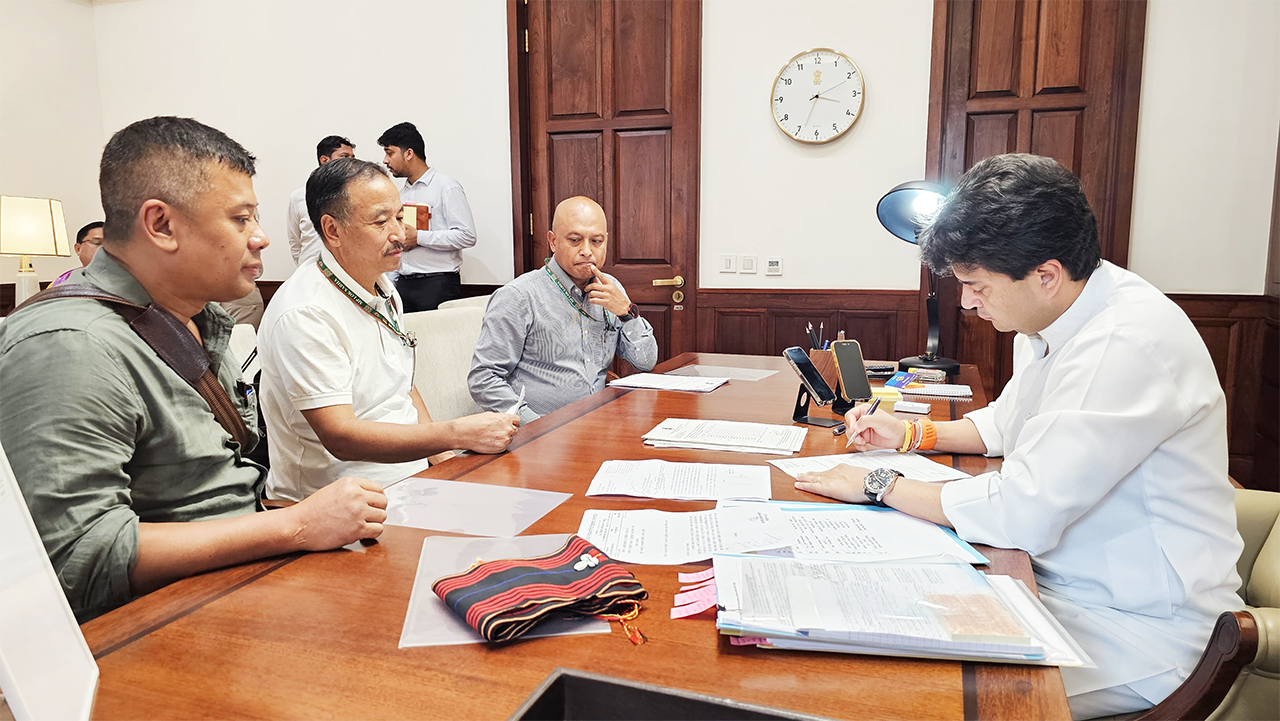Nagaland’s Lok Sabha MP S. Supongmeren Jamir met with Union Minister for Development of North Eastern Region (DoNER), M Jyotiraditya Scindia, on July 27, and Union Minister for New and Renewable Energy, Consumer Affairs and Food & Public Distribution, Pralhad Joshi, on July 28. During these meetings, the MP submitted detailed representations highlighting critical infrastructure, communication, and renewable energy challenges facing Nagaland and the North Eastern region at large.
In his letter to the DoNER Minister, Jamir flagged the prolonged delay in completion of the Dimapur-Kohima four-lane project. He urged the Ministry to send a high-powered committee for spot verifications and expedite the project.
Jamir also pointed out the gaps between officials reports and on-ground implementation of mobile connectivity in the Northeast and Nagaland. He stated despite reports claiming 100% completion of major mobile connectivity projects in Northeast, ground realities suggest that projects are not implemented.
He stated that in Nagaland construction of towers are yet to be completed and in some areas, where towers are constructed, there is no network coverage. He also pointed out that immovable properties of BSNL is not properly placed in safe zone, within security walls, besides infrastructure of office buildings and staff quarters needs improvement.
On new and renewable energy, he stated that the Ministry of New and Renewable Energy has suddenly discontinued the Off-Grid Solar programme in Northeastern region like installation of solar street lights, home lightening system, solar power packs etc, which needs to continue.
He requested the DoNER Minister to look into the matter for the greater interest of the Northeast in general and Nagaland in particular.
Download Nagaland Tribune app on Google Play

Meanwhile, in his letter to Union Minister Pralhad Joshi, the MP focused on the structural and regional constraints affecting renewable energy deployment in Nagaland.
He stated that despite a clear vision and defined targets, several structural and contextual challenges continue to hinder the effective rollout of renewable energy projects in the state.
He highlighted that despite possessing considerable potential for hydropower generation, an established and reliable technology, the state is unable to fully harness this resource due to absence of a dedicated central funding scheme for hydropower development.
Supongmeren urged the Ministry for formulation of a dedicated Hydropower Development Scheme by the Ministry of Power and MNRE, especially targeting smaller and regionally viable projects.
He said although Nagaland has made commendable efforts to adopt solar energy technologies, several barriers persist, primarily due to mismatch between central schemes and ground realities of Nagaland and the Northeast region. He disclosed that the generic guidelines, tailored largely for mainland India, do not adequately account for the unique topographical, logistical and climatic conditions of the region.
He also stated that the previous Off-Grid Solar Program under MNRE, which facilitated installation of solar streetlights, home lighting systems, solar power packs and water heaters had begun gaining traction. However, he said sudden discontinuation hindered momentum just as community-level acceptance was building. He also urged the Minister to continue this Off-Grid solar program.
On wind energy development, the Lok Sabha MP stated that while certain areas in the state exhibit potential for wind energy generation, these areas lack proper road access and transmission infrastructure. However, he said the current national wild energy schemes are geared towards large offshore wind farms, excluding smaller and decentralized applications suitable for hilly inland regions for the success of wind energy, if the Ministry can formulate for introduction f Small Wind Turbine (SWT) schemes specifically designed for inland and hilly terrains like Nagaland and provision for micro-wind systems for standalone or hybrid installations in remote areas.
Highlighting cross-cutting and systemic challenges, Supongmeren stated that while land for RE projects is general available, the lack of transmission networks in many districts impedes project implementation and construction of long transmission lines in difficult terrains significantly increases project costs.
He sought the Ministry intervention in establishing a dedicated ‘Green Energy Corridor’ for the Northeast, focusing on small and medium RE project. He also stated that there should be central funding support to build evacuation infrastructure for RE projects in remote districts.
The Lok Sabha MP further stated that difficult terrain, , lesser solar irradiance compared to other regions, and higher project costs due to logistical challenges has discouraged private investors and Independent Power Producers (IPPs) from Investing in the State.
He proposed for Central Incentives such as GST waivers, capital subsidies, and tax holidays for RE projects in the Northeast and Special category status or tailored incentives to level the playing field for Northeastern States in the national RE Investment ecosystem.
In both letters, Jamir emphasized that Nagaland and the North East require region-specific policies and financial backing from Central Government and relevant ministries to catch up with national development goals. He stressed that inclusive energy transition and infrastructure development are essential to realizing the vision of “Viksit Bharat” (Developed India) by 2047.

